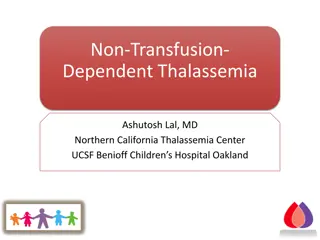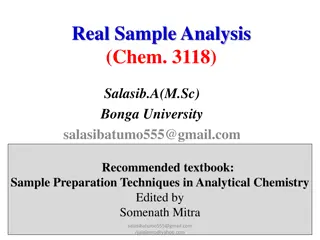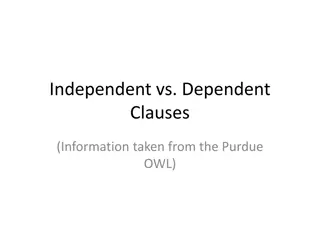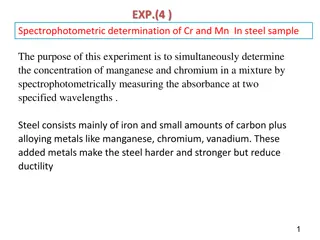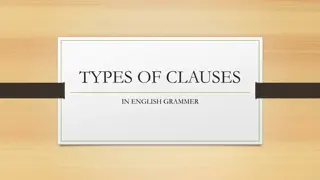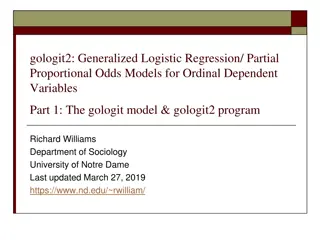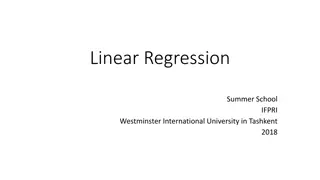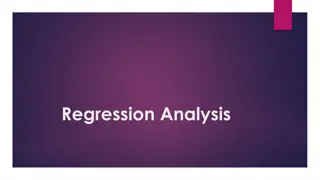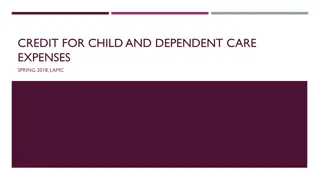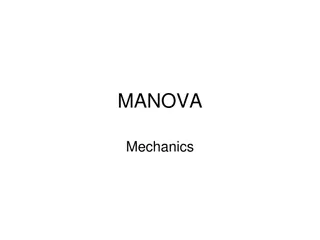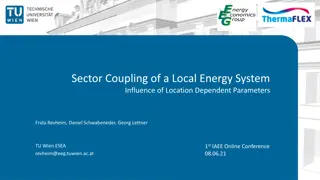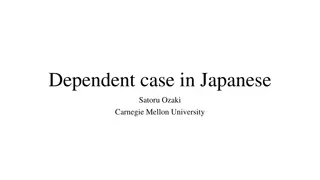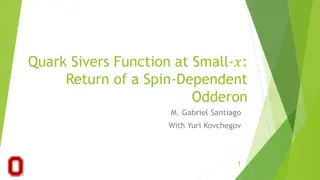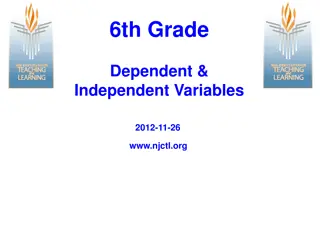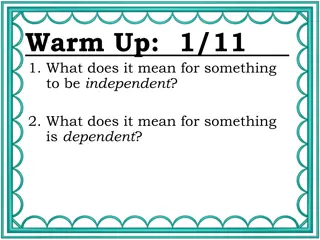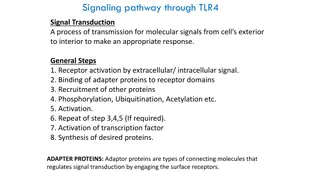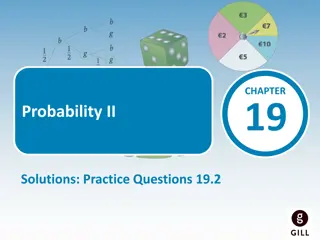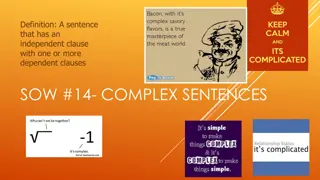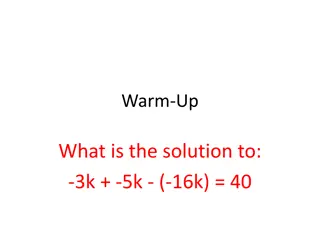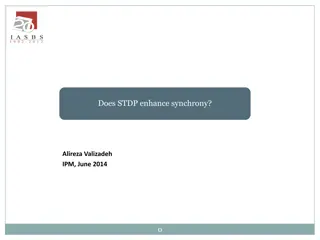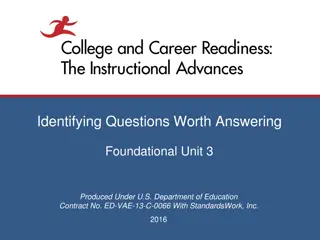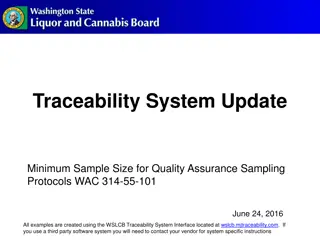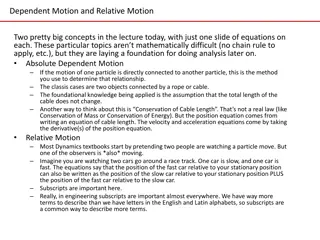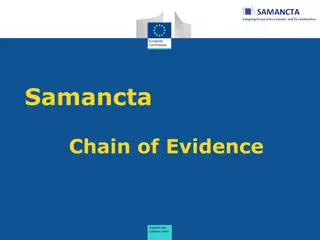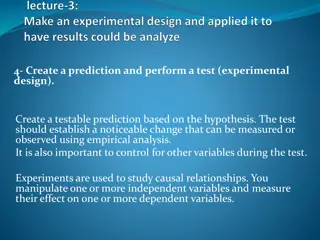Understanding Variables in Research Studies
Variables in research studies play crucial roles in examining relationships and drawing conclusions. They include independent variables that influence outcomes, dependent variables affected by independent ones, moderator variables that strengthen or weaken relationships, intervening variables lying
7 views • 34 slides
Coverage Semantics for Dependent Pattern Matching
Delve into the world of dependent pattern matching with a focus on coverage semantics. Dive deep into the concepts of denotational semantics, topologies, and coverages. Explore the interplay between patterns, values, and types in a novel way, shedding light on the essence of pattern matching.
4 views • 26 slides
Understanding Apportionment in Veterans Benefits
The concept of apportionment in veterans benefits involves the direct payment of a dependent's portion of VA benefits to a spouse, child, or dependent parent when certain conditions are met. This process ensures that dependents receive their entitled share of the benefits. However, there are specifi
0 views • 9 slides
Understanding Independent and Dependent Events in Probability
Explore the concepts of independent and dependent events in probability, learn how to determine the probability of independent events using examples, and find out the difference between the two types of events through clear explanations and illustrations. Enhance your understanding of conditional pr
0 views • 39 slides
Understanding Independent and Dependent Clauses
An independent clause contains a subject and a verb, forming a complete sentence on its own, while a dependent clause also has a subject and a verb but cannot stand alone. Dependent clauses rely on independent clauses to form complete sentences and are introduced by subordinating conjunctions. When
0 views • 4 slides
Understanding Non-Transfusion-Dependent Thalassemia
Delve into the complexities of Non-Transfusion-Dependent Thalassemia as explained by Dr. Ashutosh Lal, MD, from the Northern California Thalassemia Center at UCSF Benioff Children's Hospital Oakland. Explore the various Thalassemia syndromes, patient profiles, causes, and transfusion requirements as
1 views • 25 slides
Systematic Analysis of Real Samples in Analytical Chemistry
This analysis covers the systematic process involved in analyzing real samples, including sampling, sample preservation, and sample preparation. It discusses the importance of accurate sampling in obtaining information about various substances, such as solids, liquids, gases, and biological material
0 views • 54 slides
Understanding Independent vs. Dependent Clauses
Independent clauses express complete thoughts and can stand alone as sentences, while dependent clauses require an independent clause for support. Learn about coordinating conjunctions, comma splices, and run-on sentences to enhance your understanding of sentence structure. Avoid common errors by re
1 views • 10 slides
Spectrophotometric Determination of Cr and Mn in Steel Samples
This experiment aims to determine the concentrations of manganese and chromium in steel samples by converting Cr3+ and Mn2+ ions to light-absorbing forms, followed by spectrophotometric measurements at specific wavelengths. Steel samples are oxidized, dissolved, and further oxidized to form dichroma
0 views • 10 slides
Depth Profile Analysis of Fusion-Relevant Samples Using LIBS Technique
Analysis of fusion-relevant samples through Laser-Induced Breakdown Spectroscopy (LIBS) is conducted at Comenius University. The study compares picosecond (ps) and nanosecond (ns) regimes in depth profiling and quantification of tungsten-based coatings and other fusion materials. The research also i
0 views • 8 slides
Understanding Types of Clauses in English Grammar
A clause is a fundamental unit of a sentence, comprising a subject and predicate. Learning about the different types of clauses - Independent, Dependent, Relative, and Noun clauses - helps in enhancing grammar skills and sentence structure understanding. Independent clauses stand alone as complete s
1 views • 11 slides
Overview of gologit2: Generalized Logistic Regression Models for Ordinal Dependent Variables
gologit2 is an advanced program for estimating generalized logistic regression models, including proportional odds, generalized ordered logit, and partial proportional odds models. It offers features beyond traditional ologit, allowing for less restrictive and more parsimonious modeling of ordinal d
0 views • 27 slides
Understanding Dependent Branches in Business Operations
In any business undertaking, as the business expands, it often establishes branches to market products over a wider territory. Dependent branches rely on the head office for supply of goods and cash, and do not maintain separate accounts. This article explores the types of branches, features of depe
1 views • 5 slides
Understanding Linear Regression: Concepts and Applications
Linear regression is a statistical method for modeling the relationship between a dependent variable and one or more independent variables. It involves estimating and predicting the expected values of the dependent variable based on the known values of the independent variables. Terminology and nota
0 views • 30 slides
Understanding Regression Analysis: A Statistical Tool for Relationship Measurement
Regression analysis is a statistical technique developed by Sir Francis Galton in 1877 to measure the relationship between variables, one dependent on the other. This analysis helps estimate unknown values of a dependent variable based on known values of an independent variable. It is widely used in
0 views • 10 slides
Understanding Child and Dependent Care Expenses Credit
The Child and Dependent Care Expenses Credit allows taxpayers to reduce their tax liability by a portion of expenses incurred for caring for qualifying persons. Qualifying persons include children under 13, incapacitated spouses or dependents, and certain criteria must be met to claim the credit. Th
8 views • 10 slides
Understanding MANOVA: Mechanics and Applications
MANOVA is a multivariate generalization of ANOVA, examining the relationship between multiple dependent variables and factors simultaneously. It involves complex statistical computations, matrix operations, and hypothesis testing to analyze the effects of independent variables on linear combinations
0 views • 16 slides
Influence of Location-Dependent Parameters on Sector Coupling in Local Energy Systems
This study explores the impact of location-dependent variables on the sector coupling of local energy systems, focusing on factors such as electricity generation, energy demands, available fuel options, and more. The research aims to evaluate the profitability and operational efficiency of such syst
3 views • 20 slides
Dependent Case Theory in Japanese Linguistics
Dependent case theory challenges traditional views on case assignment, particularly in the context of Japanese grammar. This theory argues for a different approach to case assignment based on interpretative processes rather than licensing conditions. The theory is explored in-depth, discussing neces
0 views • 40 slides
Navigating Statistical Inference Challenges in Small Samples
In small samples, understanding the sampling distribution of estimators is crucial for valid inference, even when assumptions are violated. This involves careful consideration of normality assumptions, handling non-linear hypotheses, and computing standard errors for various statistics. As demonstra
0 views • 19 slides
Understanding Quark Sivers Function and Spin-Dependent Odderon
Quark Sivers function, a key aspect in quantum chromodynamics, plays a role in capturing orbital angular momentum and spin-orbit coupling. Spin-dependent Odderon, an elusive three-gluon exchange, contributes to cross sections in high-energy collisions. Small-$? TMDs from polarized Wilson lines provi
0 views • 17 slides
Understanding Phrases, Clauses, and Sentence Structures in Grammar
Learn about phrases and clauses, differentiate between independent and dependent clauses, identify subordinate conjunctions, and practice annotating sentences for independent and dependent clauses. Improve your grammar knowledge with examples and guided practice exercises from Perry High School's Gr
2 views • 67 slides
Understanding Dependent and Independent Variables in 6th Grade Science
Explore the concepts of dependent and independent variables in 6th-grade science with clear explanations and examples. Learn how these variables are defined, understand their relationship, and discover how to identify them in various scenarios using tables and equations.
0 views • 14 slides
Understanding Linear Dependent and Independent Vectors
In linear algebra, when exploring systems of linear equations and vector sets, it is crucial to distinguish between linear dependent and independent vectors. Linear dependence occurs when one vector can be expressed as a combination of others, leading to various solutions or lack thereof in the give
0 views • 20 slides
Understanding Diabetes Mellitus and Dental Plaque
Diabetes mellitus is an endocrine disorder characterized by high blood glucose levels due to insufficient insulin production or ineffectiveness. Type 1 diabetes is insulin-dependent and typically develops in childhood, while Type 2 diabetes is non-insulin dependent and often seen in overweight adult
0 views • 13 slides
Understanding Independent and Dependent Quantities in Graphical Representation
Explore the concepts of independent and dependent quantities through examples such as an endangered species project and a commuter flight scenario. Learn how to identify and represent these quantities graphically to deepen understanding. Engage in activities like jigsaw puzzles and matching graphs t
0 views • 11 slides
Signaling Pathway Through TLR4: A Molecular Signal Transduction Process
Signaling through Toll-like Receptor 4 (TLR4) involves a series of steps starting from receptor activation to transcription factor activation, leading to the synthesis of desired proteins. The pathway can occur through MyD88-dependent or TRIF-dependent pathways, resulting in different downstream eff
0 views • 5 slides
Probability Practice Questions: Independent and Dependent Events
Explore a series of practice questions to distinguish between independent and dependent events in probability scenarios. Topics covered include random selections of candies, cards, coins, children's genders, and flowers. Additionally, calculations for specific probabilities involving dice rolls and
0 views • 42 slides
Understanding Complex Sentences in English Grammar
Complex sentences consist of an independent clause along with one or more dependent clauses. The independent clause can stand alone, while the dependent clauses rely on the independent clause for meaning. Differentiating between independent and dependent clauses is essential in understanding how com
0 views • 15 slides
Understanding Independent and Dependent Variables in Algebra
Learn about independent and dependent variables in algebraic situations, equations, tables, and graphs. Discover the role of each variable, how they are classified, and their impact on functions. Practice identifying independent and dependent variables through examples and understand their significa
0 views • 55 slides
Study on the Thermal and Chemical Properties of Polymer-Cement Composites
The study investigates the resistance of polymer-cement composites to thermal stress and chemical attacks such as acidic and high CO2 environments. Results show similar color changes in control cement and polymer-cement composites after thermal stress, with the latter maintaining compressive strengt
0 views • 5 slides
Exploring the Effects of Spike-Timing-Dependent Plasticity (STDP) on Synchrony in Neural Networks
This presentation delves into the impact of Spike-Timing-Dependent Plasticity (STDP) on synchrony within neural networks, examining how the structural effects of STDP enhance synchrony and influence network dynamics. Various forms of STDP, such as pair-based additive STDP and variations like nonline
0 views • 13 slides
Analytical Toxicology: Techniques and Sample Analysis in Clinical Toxicology
Analytical toxicology involves the observation, identification, and measurement of foreign compounds in biological and other samples, such as urine, blood, stomach contents, nails, hair, and DNA. Various techniques are used to isolate and identify drugs and poisons present in these samples. This fie
0 views • 12 slides
Enhancing Reading Comprehension Through Text-Dependent Questions
This resource delves into the significance of text-dependent questions in improving students' reading comprehension skills by emphasizing the importance of evidence from the text, building knowledge through nonfiction, and developing critical thinking abilities. It highlights key advances in educati
0 views • 16 slides
Utilizing Different Samples for Diagnostic Testing in Medicine
The practice of diagnostic testing in medicine goes beyond blood and stool samples. Gathering urine samples, for example, allows healthcare providers to assess various health aspects, such as kidney function, urinary tract infections, diabetes, and more. By examining the color, clarity, odor, densit
0 views • 21 slides
Quality Assurance Sampling Protocols for Flower Lots under WAC 314-55-101
Quality assurance sampling protocols for flower lots under WAC 314-55-101 dictate that at least 4g of flower lot samples are required, with procedures outlining the deduction of four separate samples from different quadrants of the lot to ensure representativeness. The WSLCB Traceability system enfo
0 views • 4 slides
Understanding Dependent and Relative Motion in Dynamics
Dependent Motion and Relative Motion are fundamental concepts in Dynamics, providing the foundation for future analysis. Dependent Motion involves constraints like ropes or cables, while Relative Motion considers observers in motion. Dynamics involves applying a limited set of equations in diverse w
0 views • 18 slides
Ensuring Chain of Evidence Integrity in Cargo Sampling
The chain of evidence is crucial in cargo sampling to establish a direct link between declared cargo, samples taken, and analyst's findings. This involves physical measures like identification of goods and representative samples, as well as documentary measures such as examination accounts and labor
0 views • 13 slides
Designing a Controlled Experiment: Steps and Considerations
Experimental design involves systematically testing hypotheses by manipulating independent variables and measuring their effects on dependent variables. This process includes considering variables, designing treatments, assigning subjects to groups, and planning measurements. To ensure valid conclus
0 views • 11 slides
Understanding Paired-Samples Designs in Research
Paired-samples designs are valuable in research when the assumption of independence is violated, leading to dependency across groups. These designs involve comparing means of two related groups with smaller variance in the dependent variable. Repeated-measures designs offer a framework for successiv
0 views • 20 slides





